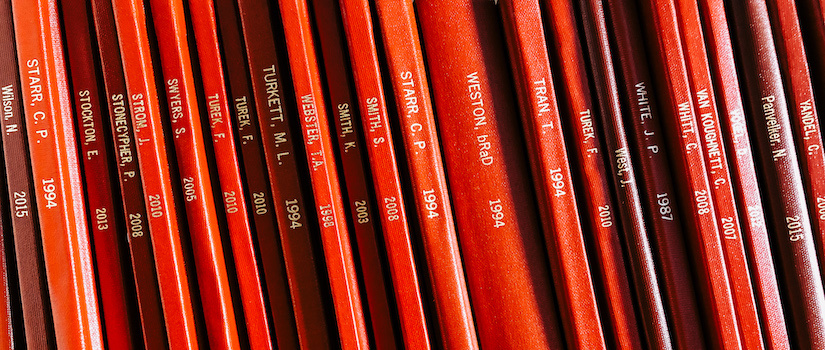What Is the Senior Thesis?
The senior thesis is designed to be the culminating experience of a student’s career at South Carolina Honors College. It is a chance for students to ask and answer meaningful questions about the natural world, social or political systems, history and culture, artistic expression, the creative process, or the application of knowledge to specific challenges. Students are free to choose their thesis topics and may elect to write a thesis or complete a project outside their majors. Students who must complete a thesis or capstone project related to their major course of study (e.g., students in the Molinaroli College of Engineering and Computing) will submit this project for their Honors thesis.
Students can opt to complete either a research-based or project-based thesis:
A traditional research thesis is an extended original project designed to answer a question of interest to the student. Some common research aims might include interpreting and comparing primary texts; constructing and testing models that reflect theories of human behavior, social or political systems, or the natural world; making human action, symbols and communication intelligible at the individual and collective levels; exploring how social meanings are constructed; and evaluating current practices and suggesting more effective ones (see Lipson’s How to Write a BA Thesis, 2018).
A creative thesis is original work in the visual arts, literary arts, applied arts, performance or digital art. The project is accompanied by a critical introduction, which explores the various aesthetic, theoretical, social or historical influences on the project or the specific individuals, artifacts or genres that shaped the student’s approach. The introduction also describes the overall approach to creating the project.
An applied project uses research, theory or principles from academic discipline(s) to explore a real-world context. Such projects may include business, marketing or communication plans; podcast series; informational materials for a community organization; educational materials; and app, game or web design. The project is accompanied by a critical introduction, which describes the larger problem or goal driving the project; theoretical, contextual or practical concerns shaping the project; design and implementation process; and implications for practice or future iterations.
Benefits of Completing a Senior Thesis
Whether students complete a research-based thesis or a creative or applied project, we believe engaging in this type of work helps students develop valuable career and life skills. Students who complete the senior thesis experience growth in four key areas that are valuable regardless of their chosen fields or future paths, plus one additional skill set keyed to their specific project type.
Skills Students Develop When Completing a Thesis
Students will learn to generate original ideas and solutions by making new connections, questioning assumptions and exploring different perspectives. Evidence of this varies across project type.
- Research projects: synthesizing literature in fresh ways, developing new theoretical frameworks or adapting research methods to examine unexplored questions.
- Creative projects: developing a personal artistic vision, making intentional choices that show originality within the field's traditions or pushing the boundaries of what's possible in a given medium.
- Applied projects: creating innovative solutions to real-world problems, adapting existing approaches to new situations or balancing competing requirements through creative design.
Students will develop the ability to identify, define and resolve complex issues through logical thinking and strategic approaches. Evidence of this varies across project type.
- Research projects: formulating compelling research questions, breaking complex problems into manageable parts, selecting appropriate methods or systematically addressing unexpected findings.
- Creative projects: identifying and solving artistic challenges, making strategic creative decisions or taking an iterative approach to solving artistic, technical and conceptual challenges while acknowledging creative constraints.
- Applied projects: assessing needs, analyzing constraints, developing implementation strategies through iterative design processes, or balancing theoretical constructs with practical realities.
Students will build capacity for sustained focus on intellectually demanding tasks while maintaining curiosity about both theoretical and practical considerations and moving beyond surface-level approaches. Evidence of this varies across project type.
- Research projects: developing disciplined scholarly habits, persisting through challenging material, allocating time for thorough investigation or developing expertise in specialized areas.
- Creative projects: sustaining focused creative practice, maintaining artistic vision through multiple iterations, taking meaningful creative risks or persisting through creative challenges.
- Applied projects: staying engaged through complex implementation phases, developing project management skills, working through technical obstacles or balancing learning with hands-on application.
Students will strengthen the ability to articulate complex ideas clearly and persuasively to different audiences through both written and spoken communication. Evidence of this varies across project type.
- Research projects: writing clear research manuscripts; defending their methods, findings and conclusions; presenting to both academic and general audiences; or adapting technical content for different contexts.
- Creative projects: articulating their creative intentions and influences, defending their artistic choices based on a conceptual framework or situating their work within broader artistic conversations.
- Applied projects: communicating the project's rationale and implications to stakeholders, presenting technical solutions to non-technical audiences, documenting processes or advocating for proposed solutions.
Additional Skills Students Develop
Beyond these four universal learning outcomes, students will develop an additional capability that's particularly relevant to their chosen approach. These specialized skills complement the universal outcomes and reflect the unique demands of different approaches to scholarly and creative work.
Students will develop the ability to ask meaningful questions, gather and evaluate evidence from primary and secondary sources or through original data collection and reach well-reasoned conclusions through critical analysis.
Students will learn to situate creative work within relevant artistic, cultural and historical contexts while articulating the conceptual framework that shapes their work.
Students will develop the ability to apply academic knowledge to real-world problems, recognizing how theory informs practice and how practical experience shapes theoretical understanding.
